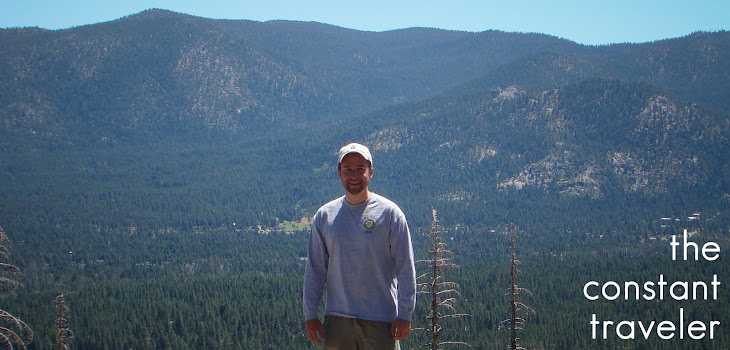Last week I dwelled in a songless place. The challenges of this program had taken their toll on me, and I was getting wrapped up in their difficulty. I was losing my motivation, my energy, and my drive in a language that I convinced myself was impossible to conquer.
This weekend we traveled to the Tunisian North. In the roads winding through the golden hills, the sprawling green canopies of its forests, and the misty blue mountains watching the sea, I kept hearing a song. It was a song I found in the landscape and the people on my journey; a song that I remember hearing so much more vividly in Oxford, Germany, and Los Angeles; a song that sings continuously, but heard only by those who know it is there.
...
We left Tunis early Saturday morning, the dinghy skyline of the suburbs giving way to yellow and bright green farmland. The hills began to roll and the sky turned bluer and the clouds gained weight and cast pleasant shade on the hills and fields (see first picture). Our first stop were at the ruins of Douga, a spectacular and well-preserved site of a Roman temple, theater, town, and cemetary (see second through fifth pictures). With adequate supervision lacking we took to the ruins as if it were a giant playground; we were kids again, jumping across crumbling four-story buildings, exploring the dark mazes under the hill, and performing on the stage.
The hills gave way to mountains and forests and a smell so moist and vegetated that I thought I had crossed somehow through the center of the earth and emerged back in the Sierra Nevadas. The two hour difference between North Africa and California threw my mind in a strange, dislocated state, drugging my perception of where exactly I was in the world.
Night fell as we reached our hotel on the beach in front of the mountains (see sixth picture). I and my Tunisian teachers and fellow Americans sat in this strange ocean-forest place, smoking shisha (a traditional Middle Eastern sweet, light tobacco) and mused about things. In the morning we explored the area, coming upon a medieval harbor with an old fortress overlooking the sea (see seventh picture).
On the road back to Tunis we found ourselves in one of the poorest parts of Tunisia. The roads became dusty and the land, despite its beauty, was devoid of large-scale farming or large cities (see eighth picture). One of my Tunisian friends told me that NGOs had in recent years supported the fast-growing women's pottery industry here by bringing pottery back to Europe or the US. The beautiful craftmanship set the bar high and people paid high prices for them; the NGOs would give the proceeds back to the women and help the region's economy.
We stopped at a cluster of tables on the side of the road, our eyes grim as we looked at the poverty and heard them offering their masterpieces for less than five dollars (a high price for that area). Two younger girls took a liking to me, flirting in French and shoving their treasures into my arms--telling me "b'lesh flooz! b'lesh flooz! (free of charge!)"--and, despite trying to convince them I didn't have a phone in Tunisia, wrote their numbers on one of my purchases. One of them explained in patient Arabic that they were studying at the university in Tunis, and had returned for the summer to help their families. I convinced them to take at least some money, just as one of my guides rescued me graciously (see ninth picture).
As I collapsed on my bed when we returned to Tunis and closed my eyes, my ears picked up the usual sound of marriage music drifting through the streets. The experiences of this weekend came back to me not in images, but in sound. For the first time in six weeks, I found myself savoring my experiences in Tunisia. The souks of Tunis, the sands of the Sahara, and the smell of the mountains by the sea all became one memory, one song, that I, through some kind of grace, finally heard.
--
Last week, I thought the next three would be unbearable. Now, I find myself dreading to leave. For six weeks, my ears shut out the songs of Tunisia--all of my attention focused on trying to swim in sinking circumstances. I got so caught up in trying to conquer a language in 2 months that I failed to remind myself that those fluent in it had been speaking it their entire life. Now that I realize this, I feel the pressure of a blind man granted sight at the end of his life.
As you watch a qunan player, you feel overwhelmed by the intensity he has in weaving his music. It's as if he is caught up in his own work, so that, at times, it is impossible to tell what came first: the song or the musician. This mystical reality is the true beauty of his talent--a talent that was only achieved by endless practice, committed dedication, and a complete submission to the songs he plays.
I must learn how to continue, for the remainder of my time in Tunisia, to hear the song that sings continuously.











No comments:
Post a Comment